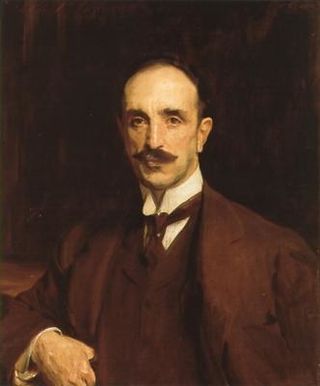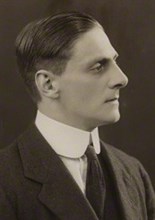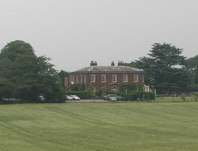Related Research Articles

Vickers was a British engineering company that existed from 1828 until 1999. It was formed in Sheffield as a steel foundry by Edward Vickers and his father-in-law, and soon became famous for casting church bells. The company went public in 1867, acquired more businesses, and began branching out into military hardware and shipbuilding.

Frederick Temple was an English academic, teacher and churchman, who served as Bishop of Exeter (1869–1885), Bishop of London (1885–1896) and Archbishop of Canterbury (1896–1902).

John Sheffield, 1st Duke of Buckingham and Normanby, was an English poet and Tory politician of the late Stuart period who served as Lord Privy Seal and Lord President of the Council. He was also known by his original title, Lord Mulgrave.

Douglas Vickers was an English industrialist and politician. His family owned the famous Sheffield firm Vickers, Sons & Co. Ltd.
Sheffield Forgemasters is a heavy engineering firm located in Sheffield, South Yorkshire, England. The company specialises in the production of large bespoke steel castings and forgings, as well as standard rolls, ingots and bars. The company was nationalised in July 2021, becoming wholly owned by the UK's Ministry of Defence.

Edward Keble Chatterton was a prolific writer who published around a hundred books, pamphlets and magazine series, mainly on maritime and naval themes.
Vickers Limited was a British engineering conglomerate. The business began in Sheffield in 1828 as a steel foundry and became known for its church bells, going on to make shafts and propellers for ships, armour plate and then artillery. Entire large ships, cars, tanks and torpedoes followed. Airships and aircraft were added, and Vickers jet airliners were to remain in production until 1965.

William Dalrymple Maclagan was Archbishop of York from 1891 to 1908, when he resigned his office, and was succeeded in 1909 by Cosmo Gordon Lang, later Archbishop of Canterbury. As Archbishop of York, Maclagan crowned Queen Alexandra in 1902.

William Edward Vickers (1889–1965) was an English mystery writer better known under his pen name Roy Vickers, but used also the pseudonyms Roy C. Vickers, David Durham, Sefton Kyle, and John Spencer. He is the author of over 60 crime novels and 80 short stories. Vickers is now remembered mostly for his attribution to Scotland Yard of a Department of Dead Ends, specialized in solving old, sometimes long-forgotten cases, mostly by chance encounters of odd bits of strange and apparently disconnected evidence.
Harry Pollitt was an English railway engineer, who was Locomotive Engineer of the Manchester, Sheffield and Lincolnshire Railway from 1894 to 1897 and its successor, the Great Central Railway, from 1897 to 1900.
Sir Lionel Henry Cust was a British art historian, courtier and museum director. He was director of the National Portrait Gallery from 1895 to 1909 and co-edited The Burlington Magazine from 1909 to 1919. He was the father of Lionel George Archer Cust.
The Sheffield Iris was an early weekly newspaper published on Tuesdays in Sheffield, England.

Henry Jackson was an English classicist. He served as the vice-master of Trinity College, Cambridge from 1914 to 1919, praelector in ancient philosophy from 1875 to 1906 and Regius Professor of Greek (Cambridge) at the University of Cambridge from 1906 to 1921. He was elected a Fellow of the British Academy in 1903. He was awarded the Order of Merit on 26 June 1908. From 1882 to 1892 he sat on the Council of the Senate of the University of Cambridge, and was an active member of a number of the university boards. He lived within the walls of Trinity College for over 50 years. Born in Sheffield, he lived mainly in Cambridge, but died in Bournemouth.
Jerry Naylor Jackson was an American country and rock and roll artist, broadcaster and inspirational speaker. From late 1961 through 1964 he was The Crickets's lead vocalist.

Oakes Park is a privately owned, historic park land in the green-belt area of south Sheffield. It contains 15 private homes as well as a 17th-century English country house which now operates as The Oakes Holiday Centre, a Christian, residential activity centre for young people between the ages of 8 and 18. It is set in extensive grounds which make it very difficult to be seen by the general public. It is situated on Norton Lane in the suburb of Norton within the City of Sheffield in England. The house is a Grade II* listed building, as are several other buildings and features.

Colonel Thomas ('Tom') Edward Vickers V.D. was Chairman of Vickers Limited.

John Naylor was a composer and organist of York Minster from 1883- 1897.

McVicker's Theater (1857–1984) was a playhouse in Chicago, Illinois, United States. Built for actor James Hubert McVicker, the theater was the leading stage for comedic plays in Chicago's early years. It often hosted performances by Edwin Booth, who married McVicker's daughter and was once targeted there in an attempted murder. Adler & Sullivan designed a remodel in 1883. Although destroyed in two fires, including the Great Chicago Fire, McVicker's remained an operating theater until 1984. It was demolished the next year.

Dovecliff Hall is a large Georgian country house in Stretton, East Staffordshire, England which is now a country house hotel. It is a Grade II listed building.

Almyra Vickers Gray or Almyra Gray JP was a British suffragist and social reformer. She was twice Lady Mayoress of York and an early woman Justice of the Peace in 1920.
References
- 1 2 3 Grace's Guide
- ↑ Zander, p. 111
- ↑ mbajet genealogical tree